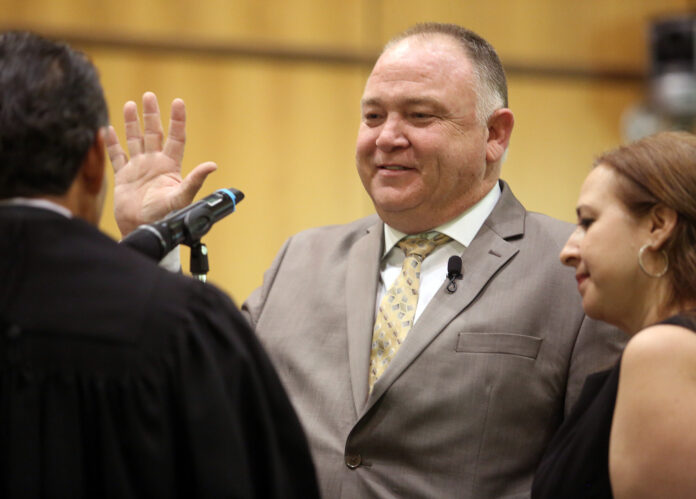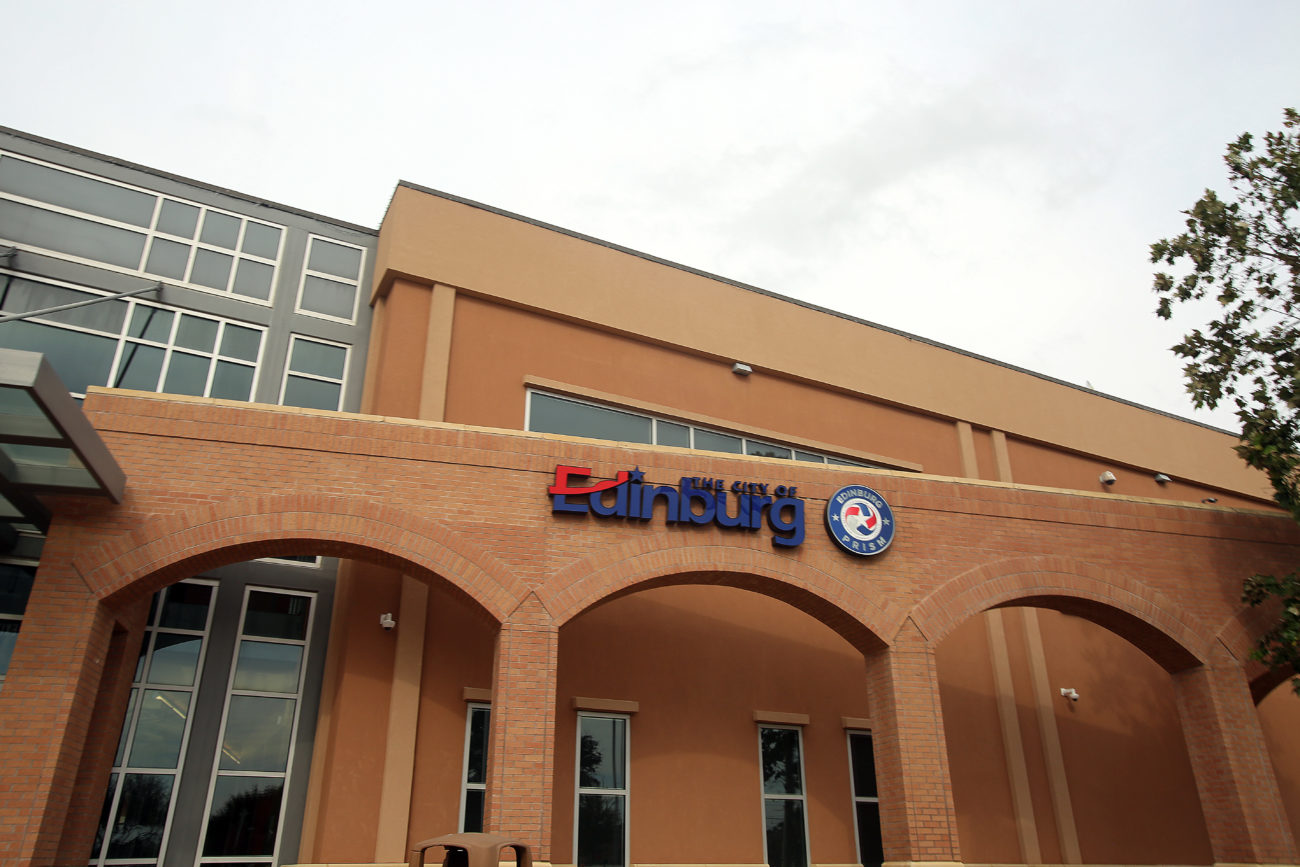
|
Only have a minute? Listen instead
Getting your Trinity Audio player ready...
|
Less than a month after overturning the results of a hotly contested Edinburg City Council election, the judge has now issued a scathing document outlining the pattern of wrongdoing that was carried out by volunteers with the David White campaign.
Meanwhile, White, the incumbent who was originally declared the winner of the race for Place 4 by just 10 votes, has now initiated an appeal of the judge’s verdict.
Visiting Senior Judge Jose Manuel Bañales handed down the 24-page “findings of fact and conclusions of law” statement on June 17, a little more than two weeks after presiding over a bench trial in the election contest.
At the conclusion of the four-day trial, Bañales ruled that more than two dozen ballots were disqualified in the race after finding assertions made by White’s opponent, Gerardo “Gerry” Lozano, to be credible.
Lozano had alleged that several voters had been illegally assisted in casting their ballots, had used fake addresses on their voter registration forms, or had been coerced to vote for White by politiqueras volunteering with his campaign.
During the course of the trial — and in the absence of any mitigating evidence from White’s legal team — Bañales found Lozano’s assertions of election fraud compelling.
However, Bañales took his trial findings one step further.
Rather than disqualifying the election results and calling for a new race to be run, the judge concluded sufficient evidence existed to instead declare Lozano the true winner.
And in the facts statement handed down last Monday, the judge outlined — voter by voter — exactly how he came to that conclusion.
At the heart of Lozano’s allegations was an assertion that members of a prominent Edinburg political family, the Palacios’, had exerted their influence to sway the election.

The Palacios family have been involved in not only Edinburg, but Hidalgo County politics for years.
White currently serves as a criminal investigator for the Hidalgo County District Attorney’s Office under Toribio “Terry” Palacios.
Previously, Palacios’ nephew, Ricardo Rodriguez Jr., served as district attorney.
Several other members of the extended Palacios family also serve in elected or public positions.
In the election contest, however, Lozano claimed that three Palacios sisters — Mary Alice Palacios, Julie Carcaño and Janie Zamorano — had unlawfully assisted voters in casting their ballots.
Bañales ruled that not only had the sisters unlawfully provided assistance to largely able-bodied voters who did not qualify for assistance, but in at least two instances, they had coerced the votes of people who were not competent to vote at all.
“(Incompetent woman) is the adult daughter of Yolanda Chapa Pulido. … Yolanda Chapa Pulido testified that she cast (incompetent woman’s) vote for David White,” Bañales stated in his fact statement.
“In viewing her when she appeared by video deposition, it was patently clear that (incompetent woman) is mentally incompetent and physically disabled and not qualified to vote,” Bañales further stated.
The judge also specifically noted that “Julie took and signed the oath of assistance” for the incompetent woman’s ballot.
In another instance, the judge found that a woman named Lorena de Leon had similarly helped her mentally incompetent aunt to cast a ballot for White, as well.

This time, however, it was sister Janie Zamorano who signed the oath of assistance.
At trial, White’s legal team stipulated to the facts of the two voters’ mental incompetence and agreed that their votes should be disqualified.
Nonetheless, in a footnote to his finding of fact in regard to Pulido’s mentally incompetent daughter, Bañales expressed his horror at how her vote had been taken.
“The Court is troubled and concerned that the sisters would have a patently ineligible person cast a vote in this election,” Bañales stated.
“Exploiting mentally and physically challenged persons to sway an election is a clear violation of law and, more egregiously, an abuse of the person of (incompetent woman) and abhorrent to the rights and respect of the mentally and physically challenged,” he further stated.
In other instances, the judge found that the Palacios sisters aided some voters who vehemently tried to deny their assistance — including one woman who was wearing a nightgown.
“Voter Rosa Maria DeLeon … was in her house when Janie, one of the sisters, came to her house; she did not know Janie; Janie said they had come to pick her to go vote; when she told Janie she was still in her nightgown, Janie told her she would not have to get out of the vehicle,” the statement of facts reads.
DeLeon tried to tell Zamorano that she didn’t require assistance and could get to the polling place herself.
“She pleaded with Janie to let her go to vote on her own; although still in her nightgown, she gave in and got in the van,” the fact statement further reads.
Meanwhile, husband and wife couple Rojelio and Graciela Ozuna testified that they both accepted a ride to the polling place from Julie Carcaño and voted curbside from within a van. Both also testified that they were physically capable of entering the polling place unassisted.
Still other voters changed their testimony between the time they sat for depositions with Lozano’s attorneys and when they were called to the witness stand at trial to say that they had actually voted for the challenger.
But Bañales found their trial day testimony untruthful.
“Having considered the totality of her testimony, the Court specifically finds by clear and convincing evidence that Maria de Jesus Armijo’s subsequent at the latter hearing is not true and that she voted for David White,” Bañales wrote of one such person.
Person by person, Bañales outlined the basis for disqualifying the more than two dozen votes.
And, where relevant, the judge also outlined the specifics of how he determined some of those votes had been cast for White.
Many of the judge’s narratives share similar fact patterns, including how voters accepted transportation to the polling place from “the sisters,” or from “Julie” or “Janie,” specifically.
The judge also affirmed that specific ballot records show that Janie or Julie signed oaths of assistance for particular voters.
None of the fact narratives name Mary Alice Palacios specifically as a person who provided transportation to voters or as a signatory for ballot assistance.
Meanwhile, since handing down his lengthy findings of fact and conclusions of law, Bañales has also denied White’s motion for a new trial.
Via his attorney, White argued that the court had erred when Bañales asked voters which candidate they had voted for.
White also argued that the court had “abused its discretion” by declaring an election winner, rather than calling for a new election. And he argued that the court had erred in finding voters had unlawfully received assistance.
On Monday, Bañales denied the motion for a new trial. White filed an appeal to the 13th Court of Appeals the same day.



